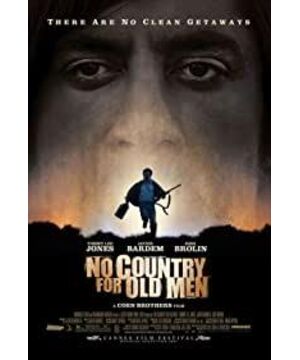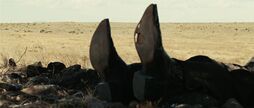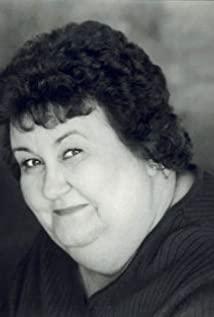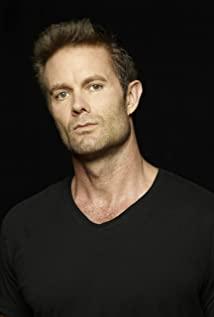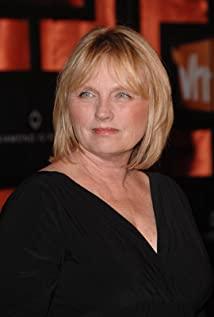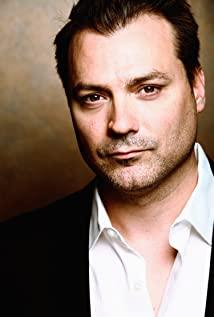Josh Brolin as Veteran Llewellyn, 39,
Javier Bardem as Killer, Anton Zieg, 38,
Tommy Lee Jones as Sheriff Ed Tom Bell, 37
(timeline based on the release of the 2007 film),
first thanked W.B. Yeats' poem "Sailing to Byzantium" for the title "No Country for Old Men". Second thanks to an 1890's brothel owner who provided Anton Zigg with his chic mushroom heads. Now let's see what the film is about.
"Three Roads"
1. The first: to Mexico.
Let's start with the sheriff played by Tommy Lee Jones. From beginning to end, he gave people a sense of strategizing and scheming. The second most important thing is that he likes to reason with his little valet and the veteran's wife. The first sheriff's appearance is about half an hour into the film. He came with a trailer and left on a horse. When they were surveying the dead body at the trading place, his little valet asked him:
"Why don't the wolves come to eat the bodies?"
"I don't know, I guess it's because they don't like to eat Mexicans." And
we Skipping the lengthy plot, the sheriff and his valet surveyed the RV where the killer left shortly after. And sat down quietly like a magic stick, drinking the milk that Anton Ziger had just drank. Then I looked at the autopsy report and found that there was no bullet at all. Intercepted a covered truck that was not tightly bundled.
"Have you heard of the one who lives in the eastern part of Sanderson. Charlie Watson? Do you know how he slaughtered cattle? Stunned with a big mallet, tied up and then cut his throat. Chaidee once tied up a cow and prepared to It was bled. Suddenly the cow woke up and started jumping and writhing. It was a six-hundred-pound beast in a fit of rage. Then Charlie grabbed the gun and aimed it at the cow's head, but, The cow was running around, jumping, and it didn't hit. The bullet bounced and hit Charlie in the shoulder. Look at Charlie, he still can't lift his right hand to get his hat. I mean, even if the The competition between man and cow. The result is uncertain."
When I endured my emotions and read such a long line of lines, I finally couldn't help laughing. A self-righteous old fool finally understood something in over an hour. Tommy Lee Jones continues his dry humor in "Men in Black" in this film. From this moment on, my liking for the character of the sheriff has risen sharply. And applauded for the only thing he had done right—protecting the veteran’s wife—for over an hour of wasted time.
The next episode took a nosedive, and I didn't expect the veteran to die in the next twenty minutes. As the real protagonist and clue character of this film, he died under the arrangement of the Coen brothers? This plot was completely unexpected to me. When the sheriff personally autopsyed the veteran, the tones began to shift toward black and yellow. The whole story began to emerge gradually. It wasn't until the sheriff talked to the old man in the wheelchair that he really understood a truth:
"You can't stop everything that's coming, and they won't slow down to wait for you. Everything is empty." Assuming that existentialism is common to us If there are meaningful people, "rules" and "opportunities" will be our permanent topics.
The two dreams narrated by the sheriff at the end of the film become the finishing touches of the whole film, the
first paragraph: in the dream the sheriff is twenty years older than his father, and somewhere in the city they meet. The sheriff's father gave him some money, but he lost it.
The second paragraph: The sheriff and his father both go back to the old days, the two of them rode down the mountain path in the snowy weather. The father rode to the front with the horn torch to make a fire, but woke up when the sheriff caught up with the father.
When you are young, the world is always simple and kind, when you are old, you will find No Country for Old Men.
2. Article 2: Access to the United States.
"Who do you think can enter the United States through this door?"
"U.S. citizens?"
"Among U.S. citizens, who can decide?"
"You can decide."
"How do I decide?"
"I ask the question, if I am satisfied If they answer, they will be able to enter the United States."
Let's not discuss whether Llewellyn's behavior of taking money is good or bad. Veteran Llewellyn is the protagonist who is the least like the protagonist in all the films that he has ever seen, and we can focus on two things about him after he takes the sheep and flees.
Let's make a bold assumption, what would have happened next if the veteran hadn't gone to deliver water to the man the night he met the post-trade murder scene? After the killer finished killing people at the police station, he led the two accomplices back to the trading location. The following plot can refer to "Deadly Romance" written by Quentin in 1993. So in turn, we can think that the character of the veteran is the only clue that the whole film is very important to promote the plot. Although he only hides boxes and finds hotels.
The scene where the young woman by the pool starts a conversation with the old soldier before he dies is the most interesting scene in the whole film.
"There's beer in my room."
"I'm waiting for my wife."
"No wonder you keep looking out the window."
"You're half right."
"And what about the other half?"
"That depends. What happened."
"But no one could have foreseen what didn't happen, and the beer was next. I could bring the ice bucket here, and you could keep your marriage going."
"No, ma'am, I know what beer brings."
"Beer just brings more beer."
Beer just brings more beer, and I smile. Undisputed truth.
3. Article 3: Road to West Texas.
In the first five minutes of the film, a man holding an air pump against a mushroom head gave me a wicked smile across the screen. My first reaction at the time was to open the barrage to see if there was anyone to protect this smile. Now I know why there is a girl Hilo who keeps persuading me to get a haircut. Anton Zieger is an extreme regularist and uses that gas pump every time he kills. This reminds me of the Hong Kong film "Accident" released in 2009. A person who strictly follows the rules and regulations will have irresistible surprises. But the presence of veteran Llewellyn was that exception.
"Don't put a coin in your pocket, mix it up with other coins, it's just a coin."
Whatever Anton Ziger does, he flips a coin to decide. The scene in the supermarket was vividly reflected. "Every killer has an intriguing logic in their hearts. This also determines whether they have a sense of beauty when they kill," Luc Besson said calmly when he created the role of the perverted policeman Stanfield in "Killer Lyon" said. Maybe in Anton Zieger's mind, what's next? What to eat? What to wear? What car are you stealing? These things can only be decided by him flipping a coin. This is also where he differs from the two-faced Harvey Dent, because there is some luck he can't create on his own.
Javier Bardem is a very obsessive person. The scene in the supermarket in the gas station made him easily win the best supporting actor of the year. I've been thinking about whether it would have been better if Heath Ledger played the role, but it's a waste of money, who knows he'll be gone in two years.
"Where does he work?"
"call it."
He said these two sentences three times.
The Coen brothers used three different perspectives to create a calm, desolate, and playful western.
To borrow a sentence from a bean friend: "This world, life, and people themselves are all absurd. Don't waste your mind to guess and theorize, because there is no guessing, no theory. Things don't have to happen for one reason. , it doesn’t necessarily have to achieve any purpose after it happens.”
I agree with only the first half of the sentence.
View more about No Country for Old Men reviews


